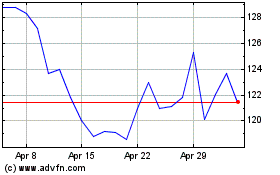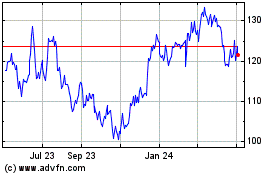By Joe Wallace and Ryan Dezember
The deep freeze that plunged millions of Texans into darkness is
rippling through energy markets in unexpected ways, producing a
financial windfall for an Australian bank and severe pain for other
companies caught up in the disruption.
The extreme weather froze wind turbines and oil-and-gas wells,
closed oil refiners and prompted power stations to trip offline,
sending a jolt through energy markets. Wholesale power prices
rocketed, as did spot prices for natural gas in Texas, Oklahoma,
Kansas and Arkansas.
The turbulence led to a bonanza for commodity traders at
Australia's Macquarie Group Ltd., whose ability to funnel gas and
electricity around the country enabled them to capitalize on
soaring demand and prices in states such as Texas.
The bank bumped up its guidance Monday for earnings in the year
through March to reflect the windfall. It said that net profit
after tax would be 5% to 10% higher than in the 2020 fiscal year.
That equates to an increase of up to 273.1 million Australian
dollars, equivalent to around $215 million. In its previous
guidance, issued Feb. 9, Macquarie said it expected profits to be
slightly down on 2020.
"Extreme winter weather conditions in North America have
significantly increased short-term client demand for Macquarie's
capabilities in maintaining critical physical supply across the
commodity complex, and particularly in relation to gas and power,"
the bank said.
Macquarie's windfall shows how big profits can be made wagering
on relative scarcity of natural gas in a country awash in the
fuel.
The U.S. shale-drilling boom unleashed so much gas over the past
decade that prices have been depressed to the point that producers
with gushers have gone bankrupt. Yet gas buyers, such as power
plants and manufacturers, are routinely left paying surging prices
when demand peaks during winter storms.
Behind such instances of energy feast and famine is a gas
infrastructure system that has failed to keep up with all the
drilling. Pipelines laid decades before the shale boom are often in
the wrong places, or too small to meet today's demand. Having space
reserved on certain pipelines can become incredibly lucrative when
uncharacteristic weather causes swells in demand.
Scarcity in Texas and the Great Plains was amplified last week
when temperatures dropped low enough to freeze shut many of the
region's gas wells and other energy infrastructure. Capacity on
pipelines into the region became precious. Traders and energy firms
that had paid in advance for the right to use these supply routes
were suddenly in position to rake in huge profits as utilities vied
for fuel deliveries.
Macquarie describes itself as the second-largest marketer of
physical gas in North America behind BP PLC, with a team in Houston
and access to 80% of pipelines spanning the U.S., according to a
person familiar with the matter. The business, which Macquarie has
built out for over a decade, received a boost from the acquisition
of Cargill Inc.'s North America power and gas division in 2017.
The Australian bank rents access to natural-gas pipelines and
electricity networks across the U.S., enabling it to profit when
prices in some regions are significantly higher than in others and
when consumers are in urgent need of fuel or power. That was the
case last week, when frozen energy infrastructure and the closure
of oil-and-gas wells set off a race for natural gas among Texas
power plants and other consumers.
Macquarie sent large volumes of gas from the north of the U.S.
to the south, where the cold weather sent prices soaring last week,
the person familiar with the matter said. It supplied electricity
in Texas as well as gas to generate electrical power.
At one point, natural gas changed hands for more than $900 per
million British thermal units at the ONEOK Gas Transportation hub
in Oklahoma, according to commodities data provider S&P Global
Platts. By Friday, prices at the hub had fallen back to about $14
per million British thermal units. That was still comparatively
high: Benchmark futures for U.S. natural gas, which are tied to
delivery at Henry Hub in Louisiana, have generally cost between
$2.50 and $3.50 per million British thermal units in recent
months.
Shares of Macquarie rose 3.4% in Sydney on Monday after the
company raised its profit outlook. They are now down 2.8% over the
past 12 months.
Millions were left without power and heat in Texas last week as
the lowest temperatures in decades wreaked havoc on the state's
utilities. Frozen water lines burst and left big residents in
cities without safe drinking water. Stores closed because they had
no power, which made food and water even more scarce.
Roughly 70 deaths, mostly in Texas, have been attributed to the
cold weather, according to the Associated Press. Some are believed
to have frozen to death in their homes.
Macquarie last year provided an undisclosed amount of investment
capital to upstart Houston-based utility Griddy Energy LLC, whose
business model is to pass variable wholesale electricity prices
through to customers. Griddy customers complained of paying lofty
sums when power prices shot up to thousands of dollars per megawatt
hour last week, according to local Texas media reports.
One customer told the Dallas Morning News that his electric bill
for five days stood at $5,000, the amount he would normally pay for
several years of power. Another told the Dallas-Fort Worth NBC
affiliate that he had been charged more than $16,000 for
February.
A Griddy spokeswoman said an order by the state utility agency
to the operator of the electricity grid to make market prices
reflect the scarcity of power pushed up prices for its customers.
On Feb. 12, the company started emailing and texting customers to
say they might be better off switching providers for a short time
to avoid exposure to wholesale prices, she said.
Corporate casualties from the freeze are also starting to
emerge. Just Energy Group Inc., a Canada-based energy supplier, on
Monday said it faced a financial hit of about $250 million, in part
from buying electricity at sky-high prices in Texas during the cold
blast. The company, which said the blow could stop it from
continuing as a going concern, saw its shares slump 31%.
In another instance, shares of Atmos Energy Corp. fell 4.4%
Monday after the Dallas-based gas supplier said it would have to
pay between $2.5 billion and $3.5 billion for gas it bought at
elevated prices in Texas, Colorado and Kansas. Atmos may issue
stock or raise debt to help to pay for the purchases, it said
Friday.
German energy company RWE AG said its 2021 earnings would be hit
by outages at the company's wind turbines, as well as from high
prices for electricity.
Write to Joe Wallace at Joe.Wallace@wsj.com and Ryan Dezember at
ryan.dezember@wsj.com
(END) Dow Jones Newswires
February 22, 2021 18:07 ET (23:07 GMT)
Copyright (c) 2021 Dow Jones & Company, Inc.
Macquarie (PK) (USOTC:MQBKY)
Historical Stock Chart
From Dec 2024 to Jan 2025

Macquarie (PK) (USOTC:MQBKY)
Historical Stock Chart
From Jan 2024 to Jan 2025
